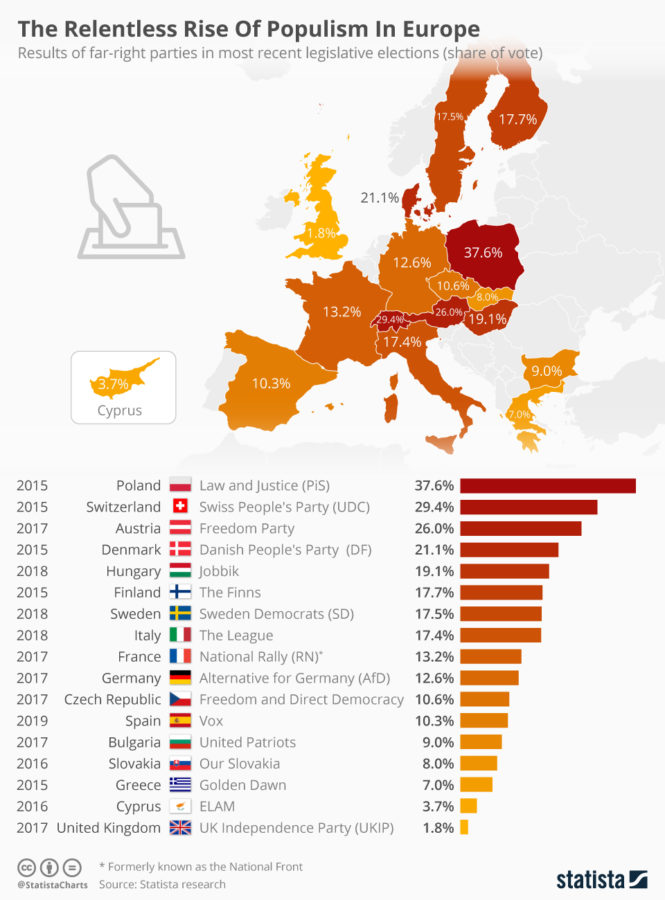Ms Zunaira Malik is studying international relations at Kinnaird College for Women University Lahore.
Introduction
In the words of Henry Adam, “right-wing politics is the systematic organization of hatred.” From French elections to the planned deadly attack launched by the Norwegian citizen in Oslo, from the criticism of critical race theory by the Republican far-right politicians to the killing of nine blacks in the South Carolina episcopal church, far-right populism is eating up the liberal democratic norms.
Based on the volont’e generale of the people, the far-right populists characterize society as separated into antagonistic or Manichean “us vs them” dichotomies. Jacinda Arden, while characterizing the 21st century’s rise in the far-right extremism, remarked that it has distinctively taken new forms. A dark cloud has been cast over the American, European, and Asian societies of the racial antipathies. This rise in far-right ideologies has evaded the prodigious liberal aura of moral authorities.
What Caused the Rise?
With potential rearing grounds prevalent in each other for far-right politics, this has now turned into a global phenomenon. Lack of cognitive closure, rigid mindset, stretched desire for obedience to authority, and extreme fundamentalist beliefs. It is a widely accepted perception that the rise of far-right activism post 9/11 is due to the complete attention of the world in submerging the Islamist threat while ignoring other factors that could contribute to global insecurity.
Another factor for the resonance of far-right-wing activism and politics is the cynicism of elites in bureaucratic hierarchies and legislative intricacies. The divergence of the modern-day representative model of liberal democracy from that of Athenian democracy fostering direct participation is another reason for the rise of far-right activism and populism.
The literary roots of post-Cold War radical right-wing outpouring include narratives propagated by discourses like the “clash of civilizations” which deepen the divide of us vs them. The redundant organizational mechanism to disseminate the far-right propaganda is another structural factor responsible for the recent trend of the far-right narrative.
Dissemination of the Narrative
The rise of far-right activism or politics all across the world is at odds with globalization where it is leaving a multiplier impact on exacerbating neo-Nazi/fascist, Islamophobic, or anti-immigration narratives. In juxtaposition to the progressive world view, or while reacting against the post-war accord over Keynesian political economy, these far-right groups have aligned themselves on neo-conservative lines.
The palingenetic semblance of ultra-nationalism with neo-Nazi/fascist rhetoric or religious fundamentalist belief system broadly characterizes the heterogeneous narrative of the 21st century’s far-right political movements. The rapid yet differential rise of far-right populism in Asia is more vicious than in European one because of its violent and frenzied tactics adopted to disseminate its narrative.
With sheer skepticism to multiculturalism, the biological conceptualization of racial antagonism, or anti-minority right narratives, the far-right political ideology is eclipsing the stable political grounds of the contemporary world order. The modus operandi of these movements includes electioneering protest and violence such as misogynist or Incel terrorism where lone actors play part in advancing the far-right narrative. The virus of far-right politics has mutated in multiple ways where they make use of digital subcultures to proliferate their narrative.
Far-right Themes
Far-right activism and politics all across the globe are centered around three themes taking a stand against hyper-globalization, a fallout against cosmopolitanism, and retaliation against elitism. The lone wolf reflects the strategic narrative of far-right activists. The typology of right-wing political parties is extensive. This includes those parties without pre-populist roots such as the Dutch Freedom Party or the Swiss People’s Party which are disentangled from the populist past.
While parties like that Austrian FPO have a populist past where they contributed to leading a strong Anschluss movement. Moreover, there are some far-right political parties that are nostalgic for Hitler and his fascist manifesto, a prime example of which is the Italian far right. These parties reflect a revisionist attitude towards cooperation and mutual existence.
There are some rightist populist parties that carry a libertarian economic eloquence. The political economy of the recent rise in far-right-wing activism and populism is centered around the notion that extensive free trade has led to horizontal and vertical inequalities in-between states leading to the celebration of far-right populist political rhetoric by the general populace. The public then becomes more inclined towards the populists who scapegoat and denigrate elites. The great recession in 2008 followed by destabilizing economic trends has contributed to the political fallout.
Democratic Backsliding
Right-wing activism or politics is responsible for the democratic backsliding because its political discourse is colored with xenophobia, ghettoization, non-institutional means to fix political dysfunction, or welfare chauvinism. The benign and toxic narratives that rightists propagate are structurally embedded in the socio-cultural spectrum of societies that have fallen prey to this evil.
The rise of far-right populism has strained the progressive attitudes within societies of Europe, Latin America, and Asia. These right-wing activist movements and politics have checked the credibility of institutions like that of the European Union; a clear manifestation of which was Brexit. The Thaksin strategies of violence and persecution have made the Asian version of far-right extremism more lethal and dangerous than the west.

The far-right populism and activism are shaking the democratic grounds of southeast Asian countries like Thailand, Indonesia, and most importantly the Philippines where Rodrigo Duterte has opted for some extra-judicial strategies to fulfill his political interests. The existence of saffron terrorism in Indian society amid the arms race has exposed the fault lines of the conflict.
The war mongering in media channels paints a horrible picture of the far-right narrative in Asian societies. The anti-institutional/internationalist narrative has tilted the balance of liberal democracies all across the world. The emergence of far-right political activists in power has proved that this movement has reached its amateur stage.
Challenges to International Law
The far-right pandemic has shocked international legal scholars. The ongoing pandemic of right-wing populism has challenged the legitimate grounds of international law on two levels. At one level the right-wing rise in politics has altered the legal environment where laws are interpreted.
Secondly, the right-wing activist is also calling for a reinterpretation of international legal rules. The world is facing two pandemics one of Covid-19 and the other of rightist politics. The far-right political wing has capitalized on Covid-19 as an opportunity to gain maximum support for their anti-Islam, anti-Semitism, and anti-immigration political tale. Right-wing extremists are calling for fewer restrictions.
Countering Far-right Extremism
Einstein’s words aptly encompass the complexity of fixing the rise of far-right extremism. He once said that politics is more difficult than physics. Strategists have chalked a three-tier approach to combat the far-right narrative in governments. One approach is named Wehrhafte Democratie which is a German model of militant and defensive democracy that asks for institutional and systematic delegitimization of parties that spread far-right narratives.
But another school of thought considers this approach as implausible to combat those mainstream far-right parties like the Dutch Freedom Party, the French FN, and the Danish People’s Party which voice a democratic narrative. They ask for the exclusion of far-right parties from the electoral alliances with the goal of isolating them. While the third school of thought asks to embrace these far-right narratives which ultimately expose its fault lines. The once stalled-out politics is shuddering the progressive political spectrum in a formidable or daunting fashion.
If you want to submit your articles, research papers, and book reviews, please check the Submissions page.
The views and opinions expressed in this article/paper are the author’s own and do not necessarily reflect the editorial position of Paradigm Shift.



















